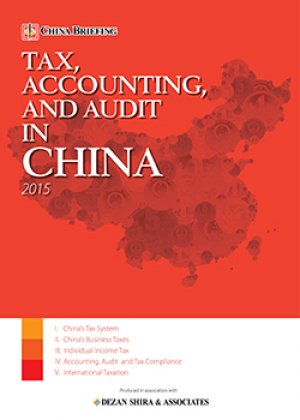China Clarifies Special Tax Treatment in Equity Transfers between Resident Enterprises
By Dezan Shira & Associates
Editor: Rainy Yao
China’s State Administration of Taxation (SAT) has recently clarified tax policies for equity and asset transfers between tax resident enterprises. Chinese tax resident enterprises are generally subject to Chinese corporate income tax (CIT) on the gain derived from the transfer of equity shares or assets. However, under the new tax policy, equity transfers between Chinese tax resident companies that meet specific criteria may be eligible for tax deferral and a temporary CIT exemption. The policy applies to all types of enterprises including wholly foreign-owned enterprises (WFOE).
Based on the new rules, four types of equity transfers will be included in the preferential tax treatment, specifically:
Equity or asset transfers from a parent company to its 100 percent directly controlled subsidiary
1. The parent company transfers the equity or assets held by it to the subsidiary based on the net book value, and the parent company receives 100 percent equity payment from the subsidiary.
2. The parent company transfers the equity or asset held by it based on the net book value to the subsidiary but the parent company does not receive payment.
Equity or asset transfers from a 100 percent directly controlled subsidiary to its parent company
3. The subsidiary transfers the equity or asset held by it based on the net book value to the parent company but the subsidiary does not receive payment.
Equity or asset transfers between subsidiaries that are subject to 100 percent direct control of the same parent company
4. Under the direction of the parent company, one subsidiary transfers the equity or asset held by it based on the net book value to another subsidiary, and the transferor does not receive payment.
 RELATED: Tax and Compliance Services from Dezan Shira & Associates
RELATED: Tax and Compliance Services from Dezan Shira & Associates
Companies need to make sure that such equity transfers have reasonable business purpose: the company’s original business activities may not be changed within 12 consecutive months after the equity transfer; and neither the transferor nor the transferee has recognized such equity or asset transfers as losses or profits for accounting purposes. In the case where the investor make any change to the company’s primary business activities, the nature of the company or the equity structure within 12 months after the equity transfer, they are required to report the changes to the local tax bureau within 30 days after the change is made.
Furthermore, the tax bureau clarified accounting rules concerning such equity transfers. The pre-approval by the tax bureau for equity/asset transfers will be abolished. Instead, enterprises are required to submit the declaration form and other relevant documents (including the general description of equity/asset transfer, the description of the net book value and taxation basis of the equity/asset transferred etc.) upon the annual taxes consolidation and payment.
|
Asia Briefing Ltd. is a subsidiary of Dezan Shira & Associates. Dezan Shira is a specialist foreign direct investment practice, providing corporate establishment, business advisory, tax advisory and compliance, accounting, payroll, due diligence and financial review services to multinationals investing in China, Hong Kong, India, Vietnam, Singapore and the rest of ASEAN. For further information, please email china@dezshira.com or visit www.dezshira.com. Stay up to date with the latest business and investment trends in Asia by subscribing to our complimentary update service featuring news, commentary and regulatory insight. |
![]()
 Tax, Accounting, and Audit in China 2015
Tax, Accounting, and Audit in China 2015
This edition of Tax, Accounting, and Audit in China, updated for 2015, offers a comprehensive overview of the major taxes foreign investors are likely to encounter when establishing or operating a business in China, as well as other tax-relevant obligations. This concise, detailed, yet pragmatic guide is ideal for CFOs, compliance officers and heads of accounting who must navigate the complex tax and accounting landscape in China in order to effectively manage and strategically plan their China operations.
Managing Your Accounting and Bookkeeping in China
In this issue of China Briefing, we discuss the difference between the International Financial Reporting Standards, and the accounting standards mandated by China’s Ministry of Finance. We also pay special attention to the role of foreign currency in accounting, both in remitting funds, and conversion. In an interview with Jenny Liao, Dezan Shira & Associates’ Senior Manager of Corporate Accounting Services in Shanghai, we outline some of the pros and cons of outsourcing one’s accounting function.
 Strategies for Repatriating Profits from China
Strategies for Repatriating Profits from China
In this issue of China Briefing, we guide you through the different channels for repatriating profits, including via intercompany expenses (i.e., charging service fees and royalties to the Chinese subsidiary) and loans. We also cover the requirements and procedures for repatriating dividends, as well as how to take advantage of lowered tax rates under double tax avoidance treaties.
- Previous Article Offshore Status of Hong Kong Companies
- Next Article Baisse des Droits de Douane à l’Importation sur Plusieurs Produits de Consommation




























